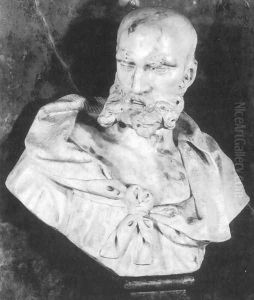Orazio Marinali Paintings
Orazio Marinali was an Italian sculptor born in 1643 in Vicenza, a city in the Veneto region known for its rich architectural heritage. Marinali's work is often associated with the Baroque period, a time characterized by dramatic expression and elaborate ornamentation. His contributions to sculpture are noteworthy for their dynamic forms and expressive detail, embodying the vitality and complexity of the Baroque style.
Marinali was initially influenced by the work of Alessandro Vittoria, a prominent Venetian sculptor, and his early career was marked by a blend of Renaissance ideals and the emerging Baroque sensibility. However, as Marinali's style evolved, he became more closely associated with the exuberance and theatricality of the Baroque movement. His sculptures, often created for religious and secular buildings, showcase a masterful handling of marble and other materials, bringing to life figures that express a range of emotions, from divine ecstasy to human suffering.
Throughout his career, Marinali remained largely based in Vicenza but his work had a significant impact beyond his hometown. He contributed to the decoration of numerous villas and churches in the Veneto region, collaborating with architects and artists of his time. His ability to capture movement and emotion in stone and bronze made him a sought-after sculptor for public monuments and private commissions alike.
Marinali's legacy is preserved in the enduring beauty and technical prowess of his sculptures. Among his notable works are the dynamic statues of saints and mythological figures, which continue to fascinate art historians and enthusiasts for their innovation and expressive power. Orazio Marinali passed away in 1720, leaving behind a body of work that significantly contributed to the richness of Baroque sculpture in Italy. His artistic achievements reflect not only the vibrant cultural milieu of 17th and early 18th century Italy but also the enduring appeal of Baroque art's emotional depth and visual spectacle.
